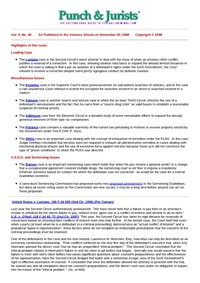Here the Court held that a warrantless search of a vehicle whose driver has been cited for but not arrested for a traffic offense may not be sustained on the basis of a "search incident to citation" theory.
Essentially, in this case, the Court ruled that the rationales …
In this case, the defendant was convicted of conspiracies to distribute, inter alia, heroin and crack. Although the district court arrived at a Guidelines sentencing range lower than the 20-year minimum sentence applicable to a conspiracy involving crack, it imposed the 20-year minimum. However, the statutory minimum sentence applicable …
This is a rare case in which the Court refused to vacate a jury award of punitive damages, in the amounts of $500,000 and $250,000, against two police officers for using excessive force during a warrantless search of plaintiffs' home.
QUOTE OF THE WEEK - Some observations on the elastic, sprawling, pervasive offense of conspiracy.
"This case [the Krulewitch case] illustrates a present drift in the federal law of conspiracy which warrants some further comment because it is characteristic of the long evolution of that elastic, sprawling and pervasive …
Here the en banc court essentially affirmed, over Judge Bright's dissent, a prior panel's decision that holding the defendant in detention until canine dogs arrived was unreasonable and not supported by sufficent probable cause.
United States v. Salzano, 149 F.3d 1238 (10th Cir. 1998) (Judge Ebel)
United States …
In this case the Court explored the meaning of "atypical case" as used in USSG § 1B1.2(a) and, while it held that this was not an "atypical case", it also held that the district court erred by applying the proviso.
The defendant in this case was charged with …
The defendant in this case was charged with bank theft, counterfeiting and access device fraud. He ultimately pled guilty, although there was no written plea agreement. He was sentenced under the Guideline applicable to burglary - and on appeal he argued that he should have been sentenced under the …
Last year the Second Circuit authoritatively pronounced: "We have never held that a failure to pay fees or an attorney's motion to withdraw for his clients failure to pay, without more, gives rise to a conflict of interest and decline to do so here." U.S. v. O'Neil, 118 F.3d …
United States v. Adkinson, 135 F.3d 1363 (11th Cir. 1998) (Judge Hill) ("Adkinson I")
United States v. Adkinson, 158 F.3d 1147 (11th Cir. 1998) (Judge Hill) ("Adkinson II")
These two rather extraordinary decisions deal principally with a Klein tax conspiracy and they are noted because they show the extremes …
In this case a class of inmates at Bayside State Correctional Facility filed a civil rights action, alleging that the guards had engaged in a pattern of physical abuse, threats and other unconstitutional acts in retaliation for the murder of a prison guard. The defendants moved to dismiss the …
In this case a class of inmates at Bayside State Correctional Facility filed a civil rights action, alleging that the guards had engaged in a pattern of physical abuse, threats and other unconstitutional acts in retaliation for the murder of a prison guard. The defendants moved to dismiss the …
Here the Court affirmed that the proper subjective standard calls for a showing of an intention to do what is known to be wrong - and based on that standard the Court did not find any legal error with the lower court's conclusion.
In one of the many …
Here the Court concluded that a non-dangerous pretrial detainee, whom institutional medical personnel sought to forcibly treat with antipsychotic medication solely to render him competent to stand trial, was constitutionally entitled to greater protection than that afforded by the administrative procedures delineated in 28 C.F.R. § 549.43.
The Government …
Here the Fifth Circuit joined the holdings of the Second, Seventh and Eleventh Circuits in holding that the Reves' management and control test does not apply to a RICO conspiracy, conclusing that "Reves addressed only the extent of conduct or participation necessary to violate a substantive provision of the …
